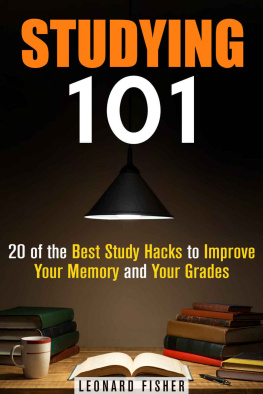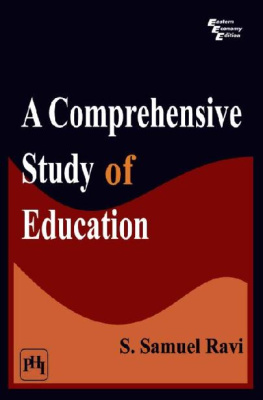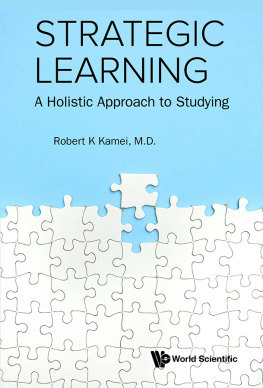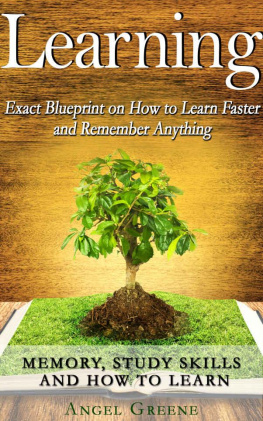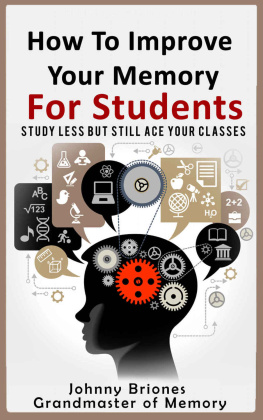Introduction
As I look back on my life, I am amazed that it has been 20 years since I sat in a classroom listening to my teachers and forcing to study. I would remember dragging myself out of bed at six in the morning, getting showered and dressed and rushing to the bus stop in order to catch the bus before I had a long walk to school.
If you are like most kids the thought of studying is like taking medicine when youre sick. You know you have to do it but you fight it all along the way. Well, I am here to tell you that studying isnt all that bad. First of all it helps to develop habits and routines in your life.
As you grow older and wiser, you will soon come to realize that what you learned in school and the habits you developed will stick with you throughout your life. Now I am here to tell you a few secrets. First secret is in 20 years no one is going to care if you get a 60, 70, 80 or 100 on a specific test. No one is going to care if you knew the state capital of Connecticut on Mr. Jones fifth grade Social Sciences class or if you got question number five wrong on Mr. Millers Math Quiz. The world moves forward and so should you.
What people do care about is if you learn habits and form routines and get the job done to the best of your ability. Now I have learned that many people have different standards to how they want to get things done and what they expect from people. Some of these standards are reasonable, and some are outrageous. The point is you need to learn how to take a task, complete it and retain that information for later use in life.
And that is where good study habits come in. So in this book I will go over study habits and give you some simple tips and techniques that you can use. At the end of this book, it will be your job to review, use, modify and apply these techniques to your life. It doesnt matter the number of tips and tricks that you use it only matters what ones you use and apply to your life.
Copyright 2015 by Rolling Bits Software - All rights reserved.
This document is geared towards providing exact and reliable information in regards to the topic and issue covered. The publication is sold with the idea that the publisher is not required to render accounting, officially permitted, or otherwise, qualified services. If advice is necessary, legal or professional, a practiced individual in the profession should be ordered.
From a Declaration of Principles which was accepted and approved equally by a Committee of the American Bar Association and a Committee of Publishers and Associations.
In no way is it legal to reproduce, duplicate, or transmit any part of this document in either electronic means or in printed format. Recording of this publication is strictly prohibited and any storage of this document is not allowed unless with written permission from the publisher. All rights reserved.
The information provided herein is stated to be truthful and consistent, in that any liability, in terms of inattention or otherwise, by any usage or abuse of any policies, processes, or directions contained within is the solitary and utter responsibility of the recipient reader. Under no circumstances will any legal responsibility or blame be held against the publisher for any reparation, damages, or monetary loss due to the information herein, either directly or indirectly.
Respective authors own all copyrights not held by the publisher.
The information herein is offered for informational purposes solely, and is universal as so. The presentation of the information is without contract or any type of guarantee assurance.
The trademarks that are used are without any consent, and the publication of the trademark is without permission or backing by the trademark owner. All trademarks and brands within this book are for clarifying purposes only and are the owned by the owners themselves, not affiliated with this document.
Chapter One: Developing Good Habits
When it comes to life and everything that we do in life it all breaks down into the habits and the actions that we follow. Ever since we were children all we learned in life were habits. We learned to roll over in our cribs; we learned to cry when we were wet, hungry or scared. We learned to crawl then eventually walk, run and then speak.
So learning habits is a natural thing. As humans, we are conditioned to learn and use habits throughout our lives. Determining if a habit is good or if a habit is bad is a suggestive statement. First off if a habit keeps you from getting hurt then that is a good habit to have. If the habit you have annoys someone, like biting your fingernails, chewing with your mouth open or humming when you work, are neither good nor bad.
So What Is A Habit?
A habit is something that is learned through study or experience that is repeated on a subconscious level throughout the course of our lives. Habits determine how we accomplish tasks and interact with the world and can be learned and modified throughout life with desire and action.
Breaking Bad Habits
When you have a bad habit first off what makes it so bad? Well, a bad habit is something that keeps you from doing something positive. For example, smoking is a bad habit. Why? Well for many reasons. It is harmful to your body; it pollutes the environment and could be fatal after years of use.
When it comes to breaking bad habits the first thing that you have to do is really desire to break the habit. When it comes to habits, it is not always easy to stop doing something that we have been doing for a long period of time. You will really need to focus and make an effort to change in order to break the habit.
Developing Good Habits
Developing good habits will get you long faster and easier in life. When we work towards positive goals and actions, we soon see the results in our lives and the lives of others moving forward. When it comes to developing good habits, it is important to set goals. When you set a goal, you have something to achieve such as a reward or just some form of personal satisfaction
In the next chapter, we will focus on a specific area of habits that you will need to master. Once you learn these habits, you can apply them to your life in any area. We will specifically be talking about studying for school. I chose this topic because when we are in school we are learning all the fundamentals that we will then apply to the rest of our lives. If we learn good study habits, then we can apply them to work habits, family habits, and life habits.
When you learn about habits, you will soon realize that everything ties together and there are reasons why we are taught specific skills in life. Now you may think that you will never need to learn why one special event in history occurred and may never really care. But when you go through life these bits of information will show up in random areas of our lives. Learning how to deal with them is the greatest and most beneficial habit of them all.
Chapter Two: 20 Study Habits for School
When we are in school, we will go through year after year learning basically the same information over and over. This repetitive process is what trains our brains to learn and grow. When we start out in school, we are taught English and Math. In first grade, we are taught the letters A Z and our numbers 0 9. In second grade, we are taught basic words like cat, dog, mouse, and house. We are also taught to count add and subtract.
These basic skills are the foundation that we use when we talk about forming habits. As stated before a habit is something that is learned and repeated. Now if we were taught that 1 + 1 = 2 in life and this information was repeated from day one of school to the final day of college then we would associate it with a habit and apply it to any time we see 1 + 1.

